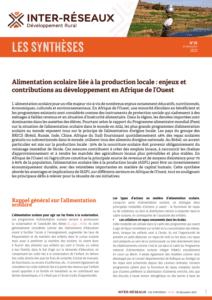 GDS: What is the main objective of an agricultural policy?
GDS: What is the main objective of an agricultural policy?
EPB : In the Philippines – because that is where I come from – it is hard to say what is the aim of an agricultural policy. Our farmers would say we don’t have any agricultural policy at all. If we do, it is so incoherent so that we don’t know. I think the aim of an agricultural policy should be — how to develop the agricultural sector such that it brings incomes, jobs, food security to the people, particularly small farmers, producers and entrepreneurs. The policy should lead to a sound and progressive countryside where agro-industrialization can happen and small farmers benefit and are involved in the process.
GDS: Is there one text that gathers incoherent elements ?
EPB : We have a medium term development plan and the medium term development plan specifies, for example, what objectives in agriculture will be achieved and basically for the Philippines it is “Increase yield” and “increase production of crops” and increased jobs in the farm. GDS : So there isn’t one vision that tries to promote one kind of agriculture?
EPB : It doesn’t say that much. We know they would like to increase production then we see what their programmes are. They put money into hybrid seeds, they put money into field testing of GM crops. Then we know that this is their policy because this is what they are doing.
GDS : Farmers’ organisations never were associated to the building of a national agricultural policy?
EPB : There are consultations but after these consultations you never get to see the results. Yet the Philippines government has some institutional mechanisms for involving farmers’ organisations in policy making. They have the National Agricultural Farmers’Council (NAFC), which is like a consultative mechanism. But we don’t see the positive impact of these agricultural policies to small farmers. We see that many of the agricultural farmers who really benefit are the bigger ones, the plantation owners, etc. When funds are allocated for agriculture, they go to bigger farmers in the Philippines, and to plantations. I think we can learn much from our Korean, Japan and Taiwan counterparts. The farmers are strongly involved in the formulation of national agricultural policies and strategies. Most of us are in the same state of agricultur in the 1950’s and 1960’s, but now we are left so much behind.
GDS : Could you tell us about the regional level?
EPB : That is what we are really pushing for. For example in the South East Asian region there is an intergovernmental body called Asean, Association of South East Asian Nations (Asean). We are calling for a strategic agricultural policy that promotes the interests of small scale men and women farmers and their development because right now with all the policies on trade, on free-trade agreements we see that agriculture is like a commodity that is being traded and small farmers are very much affected with this kind of agreements. We are calling for a sound agricultural policy that balances trade with the development of the small-scale men and women farmers. There is not enough dialogue at the regional level, but it is something that we are working on.
GDS : Is there any exchange that you would have with West Africa, to know how they work for instance?
EPB : Yes I was in the world social forum last year in July 2007 and I learned about their struggle with the EPAs (European Partnership Agreement). And in Asean like in the EU And in ASEAN there is ongoing EU=ASEAN FTA negotiations, so I said to the African farmers “we should learn a lot from you and your struggle with the EPAs because we are now facing with the EU, we have to know how you could be associated to the negotiations, and heard”…
GDS : What is your vision of agriculture?
EPB : Agriculture is something that has to be sustainable. There must be a kind of agricultural system that takes care of the people. It should be an agriculture that allow farmers to have a life that is just, that is dignified for them. It should be agriculture in the hands of the small men and women farmers and not agriculture in the hands of corporation and big agroindustries.
AFA is a regional alliance of 9 farmers organisations in 8 countries in Asia representing about 10 million farmers. For further information : http://www.asianfarmers.org







